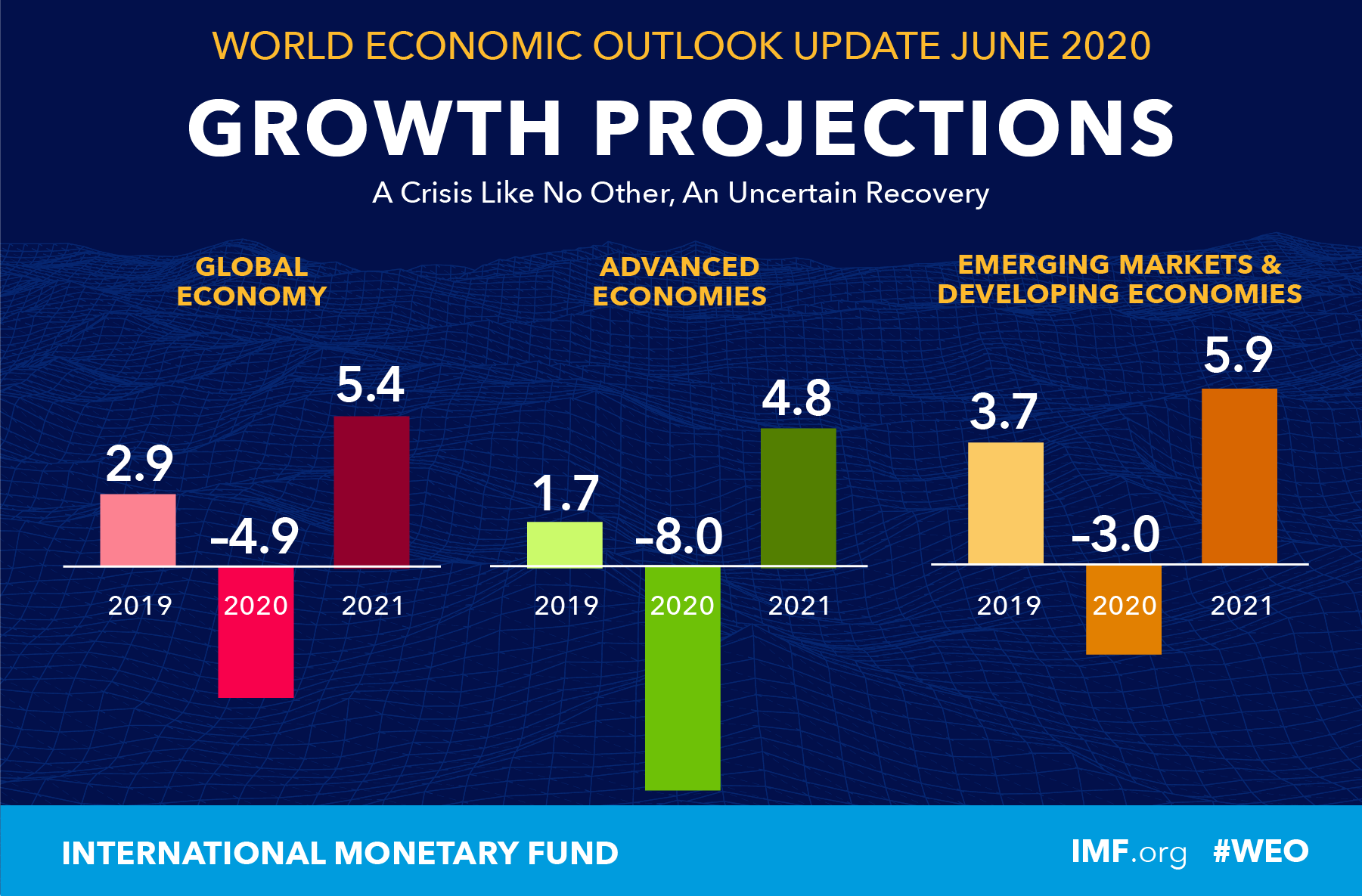-
 ssu
9.8k
ssu
9.8k
Well sorry if economics is a bit weird, or if in economics and in economic literature they have been called "speculative bubbles" at least since the 1970's (like here and then later here or here...). Yet this shouldn't be your counterargument to what I'm saying...or the thing we debate about.calling them speculative bubbles becomes a bit weird. — Benkei
The simple fact is that (asset bubbles/debt bubbles/speculative bubbles) aren't in the kind of econ 1.0 terms that have been generally accepted with a theoretic model as the issue is still quite disputed (just as is with any question that is current in an academic field of study).
What make's it "the last" one? It didn't burst, I think we are living now in that bubble economy still... and the pandemic might be perhaps the final straw that truly will burst it.I think this was true of the last bubble. With wrong incentives and no skin in the game for a lot of people. — Benkei
Or then we can start to believe in MMT.
(Which I find quite puzzling.)
Or simply let's have that deflation and start of with totally new financial sector.What we need, in my view, is smaller financial institutions that aren't too big to fail and quicker and more robust bankruptcy and resolution mechanism when they do fail. — Benkei -
 Benkei
8.1kWhat make's it "the last" one? It didn't burst, I think we are living now in that bubble economy still... and the pandemic might be perhaps the final straw that truly will burst it. — ssu
Benkei
8.1kWhat make's it "the last" one? It didn't burst, I think we are living now in that bubble economy still... and the pandemic might be perhaps the final straw that truly will burst it. — ssu
I distinctly recall houseprices losing value significantly. Of course, they've rebounded since on the "solution" offered by central banks to bail-out the banks that would've otherwise gone bankrupt for fear of an imploding financial sector. This time every asset category is just overvalued; We had negative yield on 30-year bonds for a while because of the flight to safety in NL and DE. Stocks are overvalued and property is through the roof again.
Or simply let's have that deflation and start of with totally new financial sector. — ssu
Well, I already called the fear of deflation irrational but... that only concerns goods and services price deflation. There's no statistically significant link between such price deflation and diminished output. It's different for asset prices though, in particular property price deflation combined with high levels of private debt. Here the link is obvious and serious.
How would you solve that? -
 ssu
9.8k
ssu
9.8k
This is the way it has gone. Perhaps the only asset class that was let at least partially to come down was indeed the real estate sector, because the millions of homeowners were not simply connected as Wall Street is. Here "socialism for the rich" comes to play. But you are right that now the bubble is nearly in every (if not every) asset class.Of course, they've rebounded since on the "solution" offered by central banks to bail-out the banks that would've otherwise gone bankrupt for fear of an imploding financial sector. This time every asset category is just overvalued; We had negative yield on 30-year bonds for a while because of the flight to safety in NL and DE. Stocks are overvalued and property is through the roof again. — Benkei
And then we got a pandemic. This is the "may you live in interesting times"-addition to the equation.
Once a massive economic downturn is forced upon on the Global economy (and rightly so, because the lives of our fellow citizens are worth more than a dent in our economic prosperity), it does have consequences. Everybody understood that this was truly an exogenous shock and was implemented by the lock downs, yet that doesn't change the underlying facts that this, again, has been a huge economic shock to the economy.
And there's no V-shaped recovery ...if we don't count the V-shaped recovery for asset inflation.

A rebound will happen, but likely we are going to be still on a lower level especially with the advanced economies. And that's the point here:
Yet the effect on unemployment will have the severe effect on the global economy going forward. That huge change in unemployment will have real consequences. And it's still not over.
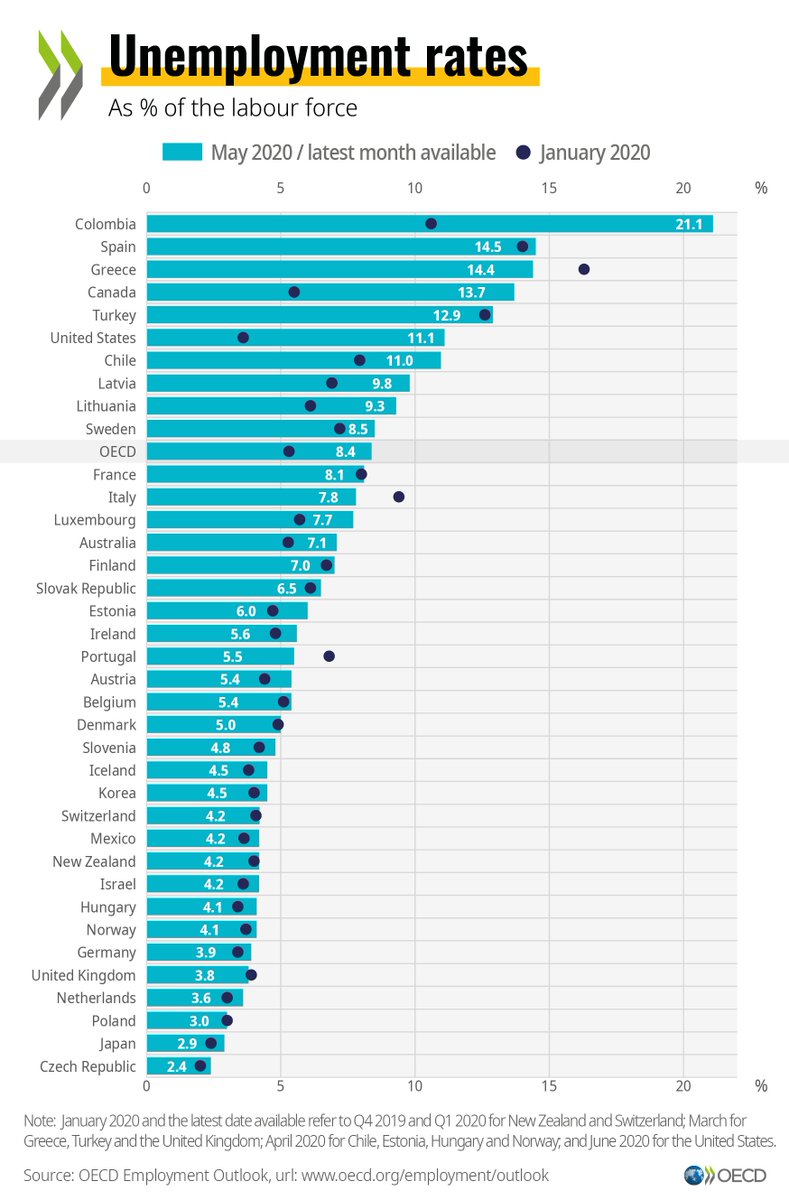
-
 unenlightened
10kOn a global level the service sector is such a huge provider of employment that the impact that pandemic has had is quite dramatic to overall aggregate demand. Same thing goes for tourism etc. — ssu
unenlightened
10kOn a global level the service sector is such a huge provider of employment that the impact that pandemic has had is quite dramatic to overall aggregate demand. Same thing goes for tourism etc. — ssu
Anyone would think that employment had value itself rather than being the cost of producing value. Employment is being produced, but no one is buying it or ever has - you cannot give the stuff away, you have to pay people to take it.
This time every asset category is just overvalued; — Benkei
I'm having a big problem making sense of all this What is the value standard by which every asset category is measured? The best I can make of it is that it is the end of the game of Monopoly; wealth has become so concentrated that the social system of exchange cannot function.
People not playing football, not painting each other's nails, not spending at bars and restaurants and not flying hither and thither on holiday does not cause the collapse of the economy unless the economy is based on pure bullshit. I would have thought that a universal basic income was the obvious solution to such a crisis as we face, linked to food and housing costs. -
 ssu
9.8k
ssu
9.8k
Done by comparison.I'm having a big problem making sense of all this What is the value standard by which every asset category is measured? — unenlightened
Most simple way is to look at real prices, meaning inflation adjusted prices. And let's say a modernized apartment in Manhattan in the 1990's is roughly as valuable as a modernized apartment in 2020. However, if you take into account how much the inflation rat has eaten off the value of the dollar and still the price is way higher in 2020 than in 1990, then it's likely you are looking at an asset bubble.
Here's housing prices:
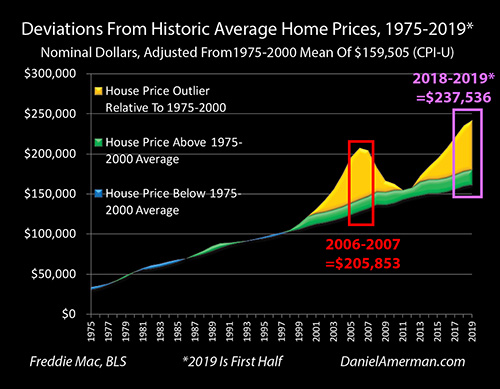
Here's a study of the inflation adjusted price of gold:
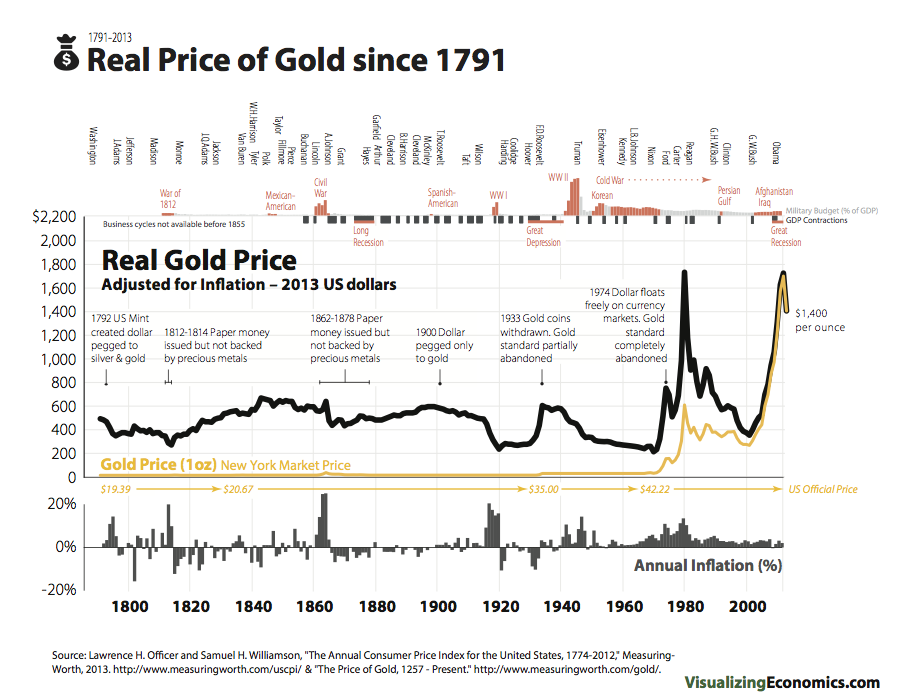
Why do you think an universal basic handout is the obvious solution?I would have thought that a universal basic income was the obvious solution to such a crisis as we face, linked to food and housing costs. — unenlightened -
 Benkei
8.1kCapital flows far outstrip the money involved in goods and services. So yes, the economy is largely financial bullshit.
Benkei
8.1kCapital flows far outstrip the money involved in goods and services. So yes, the economy is largely financial bullshit.
Let me try to illustrate (not 100% correctly but this should get the idea across). Let's say we're a country of 2, I'm a farmer, you make tools I can use. The government (central bank) made 10 coins and egalitarian as we are, you have 5 and I have 5. Since it's linked to the gold standard, the government can't make more coins without devaluing their worth.
I buy tools for 1 coin and produce food and at some point you'll buy one bushle of food for 1 coin from me. We can go back and forth like this unitl we're both dead. We'll have exchanged a lot coins and probably obtained some wealth in the meantime because the tools are pretty durable so there's a collection of them.
Now we introduce a bank. First of all when we put our coins in the bank, they will gain interest. That means the money supply needs to grow. Back in the day 10% interest wasn't uncommon so let's say we both only need 4 coins for our day to day transactions and can keep 1 coin in the bank until we die plus whatever interest we get on it (we'll give that 40 years). Compound interest means that after 40 years, we each have 41.14 coins in the bank. So both of us have 46.14 coins but since we're lazy, no productivity increase. If the money supply is 90 coins in total and the number of goods in the market remain the same, what will that do for prices? They ought to be rising, right?
Now, there's of course a good reason for this because the savings can be used for lending. And if the bank lends to @ssu, he'll do something really useful with it. So that's our third countryman. Welcome to the club, we're special because there's only three of us. Here's 5 coins to get you started because we're totally egalitarian here.
Based on the circulation of money, the bank feels comfortable to lend out the money we deposited. So let's say the bank treats our savings as term deposits of one year. But will only lend out one of the deposits so it can cover one deposit with the other if we'd withdraw early. So it will lend out 1 coin in the first year and 41.14 coins in year 40 but since it promised us both 10%, it needs to charge 25% for the yearly loans. But wait, it can lend out any profit it makes as well. So the money supply doesn't increase with 82 coins but with... (drumroll) 6,311 coins for a total of 6,319 coins of which you own 49 coins, I do too and the bank owns EUR 6,009 coins. Pretty fair huh? Especially since we're the only ones actually working in this picture!
But wait, ssu borrowed that money everytime and actually successfully invested it. So his rate of return was actually larger than the interest rate. A whopping 5% after his interest and downpayment but since he annually borrowed larger and larger sums of money (initial 1 coin + compound interest + whatever the bank lends him from it's own profits), he ends up with the other 300 coins. Prices should be rising for our tools and bushles right? Except they're not! Why God, why ain't I as rich as ssu? You fucker, you didn't work harder than I did. Give me your money. Tax him or something.
We see here the simplest divergence between goods and services price levels and that of a financial product, namely loans, which is a simple product to see how it yields profit. But a bank can of course
buy stock, buy bonds or trade derivatives instead of providing loans. Now that the bank has it's own source of money, you and I can go fuck off with our 10%, interest rates will go down as will lending rates as banks start competing to get ssu to enter into a loan with them. As lending rates drop other financial instruments become more interesting so at some point the lending rate bottoms out at the level where other financial instruments provide a higher yield. Even if ssu used his lending activities to raise productivity and add to the real economony, his wealth after 40 years is much smaller than that of the bank.
So how do we know asset prices are inflated? Because goods and service prices are not inflating, which they would if more money would be spend on goods and services simply because the money supply increases. Now, goods and services inflation can also be offset by increased productivity but this isn't happening and certainly not concurrent with increases in the money supply.
Second, sub-zero interest rates. If money were scarce, you'd have to pay a premium to be able to get a hold of it. But there's no premium, banks are basically giving it away since the central bank is giving it away too.
Third, yield or return on investment. Would you put your money into something that would take 1,000 years to pay that amount back? Doesn't really seem like a sensible investment to me. -
 unenlightened
10kWhy do you think an universal basic handout is the obvious solution? — ssu
unenlightened
10kWhy do you think an universal basic handout is the obvious solution? — ssu
Demonstrably, most people don't need to work most of the time, because wecan afford tohave to pay people for playing football, and painting each other's nails, etc. But they still need to eat. Don't call it a handout as if you own the world. It's a hand round of the plentiful resources of the world.
At the moment people who spend their lives building houses have to pay rent to people who never built shit to live in one of the houses they helped to build. That's a hand out, and a greedy grasping hand it is too. -
 ssu
9.8kNice story, Benkei.
ssu
9.8kNice story, Benkei.
Yes, that's the way to get rich: invest with debt in something that pays more than what you have to repay. And for a bank to be a bank.
Of course the idea is that these companies are so awesome that they will grow. It's silly, yes.Would you put your money into something that would take 1,000 years to pay that amount back? Doesn't really seem like a sensible investment to me. — Benkei
But let's remember that 40% of the value of the SP500, five hundred handpicked companies, is from just six companies or so. Take them out, the net companies that have their best possible upturn during a pandemic, and the rest are in a bad shape. Hence if just six companies would take a 25% drop, the whole index would be -10% down even without every other stock not changing it's price.
Well, if an society can pay to professional athletes, artists and nail salon personnel, that just shows that the society is prosperous. The more poor the society, the more people working in jobs that are basic necessities.Demonstrably, most people don't need to work most of the time, because we can afford to have to pay people for playing football, and painting each other's nails, etc. But they still need to eat. — unenlightened
But coming back to universal handouts: unemployment benefits do that thing too (feed people). Or more generally speaking, a welfare state system does it. Why the necessity to give Jeff Bezos or Bill Gates the handout?
Besides, haven't Americans already been give by Trump this during the pandemic? I remember a Finn who said his American wife got money all the way from Trumpland to spend here in Finland. What's the cure all in this? -
 magritte
593
magritte
593
Thanks for that, I don't think you're far off at all. From where I'm sitting, watching the rain fall on streets with much reduced traffic, the economy seems to have tanked.
Stagflation, noun (economics), persistent high inflation combined with high unemployment and stagnant demand in a country's economy.
The corporations live to serve their masters, the shareholders. To maintain rosy appearances in the markets, they are cutting expenses to the bone, which immediately impacts their suppliers of services. The suppliers cut working hours or just lay off workers and go out of business. Shops are closing, stores have limited inventories with rising prices, and many people just stay home watching the rain fall. But thank God, the stocks are doing so well. -
 unenlightened
10kBut coming back to universal handouts: unemployment benefits do that thing too (feed people). Or more generally speaking, a welfare state system does it. Why the necessity to give Jeff Bezos or Bill Gates the handout? — ssu
unenlightened
10kBut coming back to universal handouts: unemployment benefits do that thing too (feed people). Or more generally speaking, a welfare state system does it. Why the necessity to give Jeff Bezos or Bill Gates the handout? — ssu
Bill and Jeff have to eat too. So we give them the necessities as of right, and get them to pay some tax on their "earnings" like the rest of us. Is it a strange notion to you that the government serves everyone?
haven't Americans already been give by Trump this during the pandemic? I — ssu
Not sure what's been happening in Trumpton, but here in ready baked Brexitland, there have been arbitrary ad hoc unfair handouts to mainly businesses to continue the pretence that everyone is doing vital work. "Eat out to help out" was the slogan to justify government handouts to Macdonalds and Starbucks, and the policy of not providing meals for children, was named, but not by the government, "Eat nowt to help out." -
 ssu
9.8k
ssu
9.8k
Is it strange to understand that there is a huge difference of taking care of those necessities or just giving a sum of money to a person and hoping that the person will use it wisely?Bill and Jeff have to eat too. So we give them the necessities as of right, and get them to pay some tax on their "earnings" like the rest of us. Is it a strange notion to you that the government serves everyone? — unenlightened
Of course the question of universal basic income is far more complex. My country btw. did have an experiment on universal basic income.
Tells something that they didn't continue it. So I'm not so sure it's this great solution. -
 unenlightened
10kTells something that they didn't continue it. So I'm not so sure it's this great solution. — ssu
unenlightened
10kTells something that they didn't continue it. So I'm not so sure it's this great solution. — ssu
Well given the overwhelmingly positive results there, it tells me that it would be a great idea, that it would not lead to lots of people just doing nothing or any nonsense like that, and apart from the continuing social pressure to find employment which is just a hangover from the outmoded attitude of a non automated industrial society, there really is no downside. But pressure from capitalists would make it hard to implement widely because it is only the fear and suffering of the poor that empowers employers. If unemployment was no great threat, work conditions would have to be made pleasant and workers treated with respect. That would be awful. -
 ssu
9.8k
ssu
9.8k
I'm not so sure about that. If unemployment isn't a great threat, you aren't facing living in the streets, then simply being unemployed is a valid option.If unemployment was no great threat, work conditions would have to be made pleasant and workers treated with respect. — unenlightened
We do have here a welfare state that does take you from the cradle to the grave. You don't need to work, you do have perpetual unemployment (basically similar to UBI), the welfare state pays your rent up to 600 euros, meaning you can get a decent small flat in the suburbs. If the choice is to go and work at McDonalds, you really have to think of the equation, because you aren't going to be so much better of with the job at McDonalds. And before I continue, I have to say I totally choose the problems of a nanny state than have homeless and dirt poor people around. The dismal situation in the US is something similar to the Third World and that a welfare state where you don't need to work can leads to social exclusion becoming a problem. But that problem is quite minor compared to homelessness.
Here's the long term stats for my country on unemployment. Notice that on good times (2015) the unemployment was at the level that it is roughly now in the US. But do notice the pattern: after every severe economic recession where unemployment has exploded upwards, it has come down, but to a higher level even at good times.
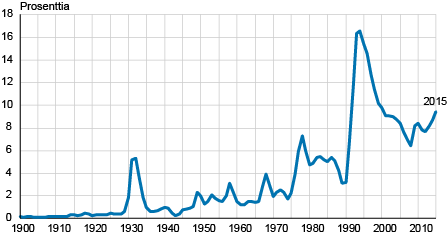
Now compare this to US unemployment. What you can see is that similar uptick after a recession cannot be seen as the US unemployment has continued to go down under 5% after a recession, even if there can be differences in the ways the statistics are done:

Of the Nordic countries Norway can easily afford the system, but we cannot. The government is still in far better situation than some South European countries, but we can fall there too. -
 unenlightened
10kthen simply being unemployed is a valid option. — ssu
unenlightened
10kthen simply being unemployed is a valid option. — ssu
What's so terrible about that? If playing football and painting nails are valid options then why not going for a walk in the park. - Oh wait, that is already a thing - called professional dog walker. And yet looking after one's own children is "simply being unemployed". Looking after someone else's children is a profession, though.
Norway can easily afford the system, but we cannot. — ssu
See I don't believe this. Lockdown demonstrates that we can live without most of the services and with 50% unemployment. If we can live without them, we can afford to live without them. When we don't have to, we probably prefer not to, so most folks will want to work to afford them; that's not a problem either. But don't pretend that the freedom not to be a wage slave is unaffordable. -
 ssu
9.8k
ssu
9.8k
Uhhh...you STILL do have all the expenses, don't forget them. All the unemployment benefits, all the bailouts and funding have to be covered. TRILLIONS of dollars pushed just into the US economy after Covid-19 hit. Yes, spending trillions with a t in one year does have an effect.See I don't believe this. Lockdown demonstrates that we can live without most of the services and with 50% unemployment. If we can live without them, we can afford to live without them. — unenlightened

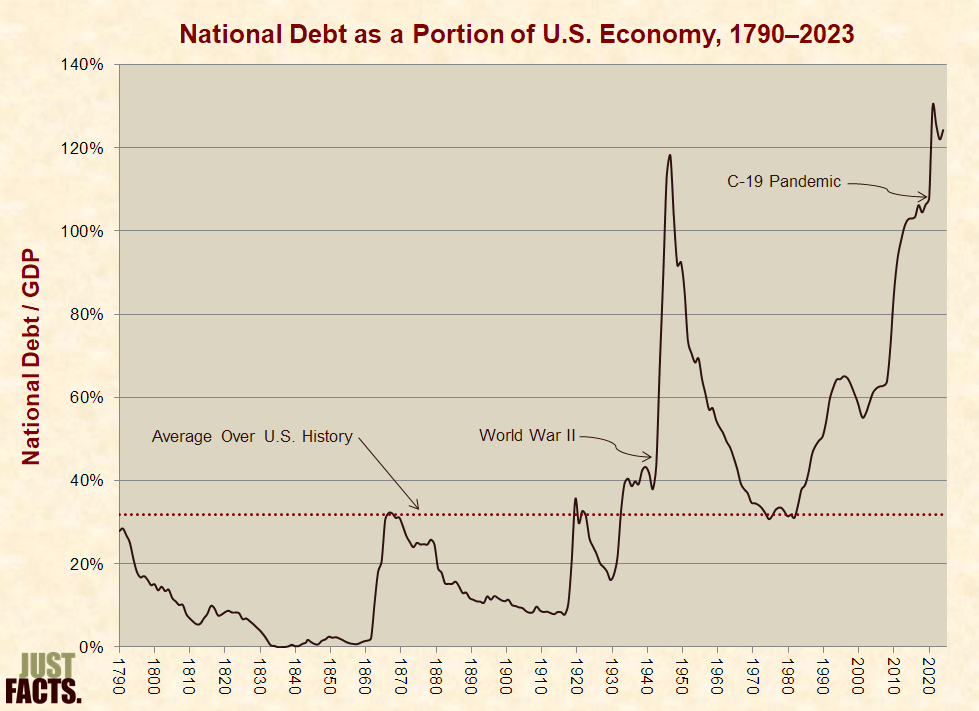
In fact, so why pay taxes at all? Why just take care of all government expenses by covering it all in new debt that the central bank then buys. At least, oh, until the pandemic goes away. If you think it will cause inflation, think again! Learn the marvels of modern monetary theory (MMT), which leave me a bit puzzled.
I think it would be important to debate MMT in this forum. I'm surprised as that there are many who supported Bernie here and not much is said about MMT. -
 unenlightened
10k.you STILL do have all the expenses, don't forget them. — ssu
unenlightened
10k.you STILL do have all the expenses, don't forget them. — ssu
You still have all the expenses either way. People got to eat. Most people these days are totally unproductive. They cut hair and play football. So if all those people stop work, hair gets longer and grass gets longer. And that's it. All the rest is just accounting for the food that they are going to eat in either case; there is no real difference. -
 ssu
9.8k
ssu
9.8k
I get your point. But society doesn't work that way, literally. That accounting you talk about is far more important than you think. Work is important for many people. Starting from things like self respect and mental health.People got to eat. Most people these days are totally unproductive. They cut hair and play football. So if all those people stop work, hair gets longer and grass gets longer. And that's it. All the rest is just accounting for the food that they are going to eat in either case; there is no real difference. — unenlightened
We do value work, be it a "productive" or "unproductive", which by your definition is quite a loose definition. And is it wrong to value work. -
 unenlightened
10kAnd is it wrong to value work. — ssu
unenlightened
10kAnd is it wrong to value work. — ssu
Yes it is wrong. It is wrong because it is contradictory as I pointed out earlier. The whole thrust of the development of civilisation has been from the beginning to work less. Work has negative value in the economy and always has had because it tends to be tiring, boring and unpleasant if not dangerous. Because it has negative value, employers have to pay. So we get animals and machines to work instead whenever possible, so we don't have to. And society literally does work that way, and literally always has, and the notion that anyone - meaning anyone working class - should be grateful for work being provided, is a foul and immoral lie. Only the devil makes work for idle hands. -
 Punshhh
3.6k
Punshhh
3.6k
I sympathise with your ideas here, I have similar ideas. But we will need someone like Corbyn as Prime Minister to even start moving in the right direction. To think that right leaning conservative leaders might move in that direction is naive. You are aware I presume of the inequality in our society? In which a proportion of the population drains wealth away from the other less privelidged parts of the population. There are literally people who don't work, but live off the back of others working, often through what could be described as exploitation. There is a group who live off the wealth accrued from the increases in property values, again they don't work and that's not to mention the billionaires and criminals.
I think it's fine to get some of these people to pick vegetables, or work in the care sector for a good wage. But somehow I doubt that they would see it that way. -
 unenlightened
10kI think it's fine to get some of these people to pick vegetables, or work in the care sector for a good wage. But somehow I doubt that they would see it that way. — Punshhh
unenlightened
10kI think it's fine to get some of these people to pick vegetables, or work in the care sector for a good wage. But somehow I doubt that they would see it that way. — Punshhh
We just have to convince them of our generosity in offering them work. I find a leather bullwhip is persuasive. -
 ssu
9.8k
ssu
9.8k
I don't think so. Besides, getting rid of meaningless work is a totally different question that getting rid of work altogether.The whole thrust of the development of civilisation has been from the beginning to work less. Work has negative value in the economy and always has had because it tends to be tiring, boring and unpleasant if not dangerous. — unenlightened
Meaningful work brings meaning to life. What's so wrong with improving things that are important to oneself through work? -
 unenlightened
10kMeaningful work brings meaning to life. — ssu
unenlightened
10kMeaningful work brings meaning to life. — ssu
Playing football is meaningful work?
Dancing is meaningful work?
Play is meaningful work?
Then there is no need for employment at all, we can all choose our meaningful work for ourselves. I choose philosophy.
But no the lie you want to convince us of is that working for the man is meaningful work. More work needed, sir. -
 ssu
9.8k
ssu
9.8k
Is making art meaningful work?
I think so.
Besides, I've done a lot of voluntary work, that I've not gotten paid. I think it has been meaningful and I've liked it. I don't know what your problem is with work.
Who has talked about full employment or obligatory work?I have to side with unenlightened on this one. I think the goal is full production, not full employment. Meaningful hobbies give meaning to. — Benkei -
 unenlightened
10kWho has talked about full employment or obligatory work? — ssu
unenlightened
10kWho has talked about full employment or obligatory work? — ssu
We do value work, — ssu
You see you talk with forked tongue.
I respect myself because I contribute to society; I get a job because I am hungry. I value people playing football because I like to watch it. I value paid work for me because it pays. You yourself talk about obligatory work, because you reject living without paid employment as a valid option. You conflate what is meaningful with what is profitable and it is offensive. -
 ssu
9.8k
ssu
9.8k
And contribution we usually think as work. Rarely we see ourselves contributing if we just get an unemployment check. That sense of contribution is important and that is my point as it seems you haven't understood my point.I respect myself because I contribute to society — unenlightened
You're the one putting words in my mouth. Naturally if someone really doesn't want to work, that is his or her decision. Yet the vast majority would like to work. And it is very important for many for their self respect as it still is a stigma to be unemployed.You yourself talk about obligatory work — unenlightened
The unfortunate fact is that a society can tolerate high unemployment because of this personal stigma, even if the unemployment is because of an economic depression. There are enough of annoying people that will say "anyone can get a job if they really want to work". Unemployment is seen as a personal failure. If you the welfare state does give protection and you don't find yourself in the street or living in your car as in the US one can find oneself, that doesn't help the motivational side.
And how this is societal attitude one can easily see how then the society totally accepts one idle class of people: the retired. Once you have worked and then retire is seen as good. Yet is the issue about changing people's views on unemployment? Well, then kicks the economy itself into the equation: those nail polishers or football players you judge to be unimportant still get their money because of a totally willing and voluntary transaction of money: somebody is genuinely willing to pay for their services and it's not similar a tax. -
 unenlightened
10kAnd contribution we usually think as work. — ssu
unenlightened
10kAnd contribution we usually think as work. — ssu
So a footballer who gets paid thinks football is work, and a footballer who doesn't thinks of it as leisure?
And a charity shop volunteer isn't contributing, but commercial shop worker is contributing?
The unfortunate fact is that a society can tolerate high unemployment because of this personal stigma, even if the unemployment is because of an economic depression. There are enough of annoying people that will say "anyone can get a job if they really want to work". Unemployment is seen as a personal failure. If you the welfare state does give protection and you don't find yourself in the street or living in your car as in the US one can find oneself, that doesn't help the motivational side. — ssu
Can you just unmuddle this for me? I say that society doesn't need people to work very much because automation. So most employment is people scratching each other's backs and picking each other's nits. And if people do a bit less or a lot less of that, it needn't matter very much to anyone, as long as everyone still gets food and shelter.
You are saying:
1. society can well tolerate high unemployment - agreed.
2..there is a social stigma to unemployment - yes, but there needn't be.
3. welfare doesn't motivate employment - yes but that doesn't matter because 1.
So what is your argument against a basic income? -
 Outlander
3.2kSo what is your argument against a basic income? — unenlightened
Outlander
3.2kSo what is your argument against a basic income? — unenlightened
A person who does something useful or worthwhile or creates something of the like should be rewarded. Most work or have compulsory education because they need to do so in order to live.
Nothing is given for free. If you eat something it's because someone either raised crops or cattle, and had to deal with the hardships/setbacks associated with it. You can't have someone sitting around doing nothing and getting stuff while someone deals with the stresses and hardships associated with producing said stuff and gets the exact same. It doesn't make any sense. You have to be rewarded for your effort or to many people that effort would be in vain, at least it wouldn't be something anyone would want to do. With joy and not out of spite, and if so, without those two, you never know what you're going to get...
UBI sounds like a great idea, in theory, if the world were as it was, groups of peoples with numbers under a few hundred thousand who can explore, cultivate, and lounge around as they please. Unfortunately, we live in a world of 8 billion. Not to be unexpected, the pleasures of fraternizing were too great to be resisted. However, that was back when your community or people would inflict harsh punishment on you for neglecting your offspring. Now, you just offer up for adoption or the State to handle your progeny if you're "unable" or unwilling usually (and that's 90% of most cases). That's what they wanted so that's how it is. So. You work. Simple, really.
You can have an economy with UBI where everyone works if they please (which most won't). Meanwhile, your next door neighbors may actually instill or rather correlate their currency to work and effort. Over time, which one do you think will hold more value? See the Zimbabwean dollar.
Welcome to The Philosophy Forum!
Get involved in philosophical discussions about knowledge, truth, language, consciousness, science, politics, religion, logic and mathematics, art, history, and lots more. No ads, no clutter, and very little agreement — just fascinating conversations.
Categories
- Guest category
- Phil. Writing Challenge - June 2025
- The Lounge
- General Philosophy
- Metaphysics & Epistemology
- Philosophy of Mind
- Ethics
- Political Philosophy
- Philosophy of Art
- Logic & Philosophy of Mathematics
- Philosophy of Religion
- Philosophy of Science
- Philosophy of Language
- Interesting Stuff
- Politics and Current Affairs
- Humanities and Social Sciences
- Science and Technology
- Non-English Discussion
- German Discussion
- Spanish Discussion
- Learning Centre
- Resources
- Books and Papers
- Reading groups
- Questions
- Guest Speakers
- David Pearce
- Massimo Pigliucci
- Debates
- Debate Proposals
- Debate Discussion
- Feedback
- Article submissions
- About TPF
- Help
More Discussions
- Other sites we like
- Social media
- Terms of Service
- Sign In
- Created with PlushForums
- © 2026 The Philosophy Forum


